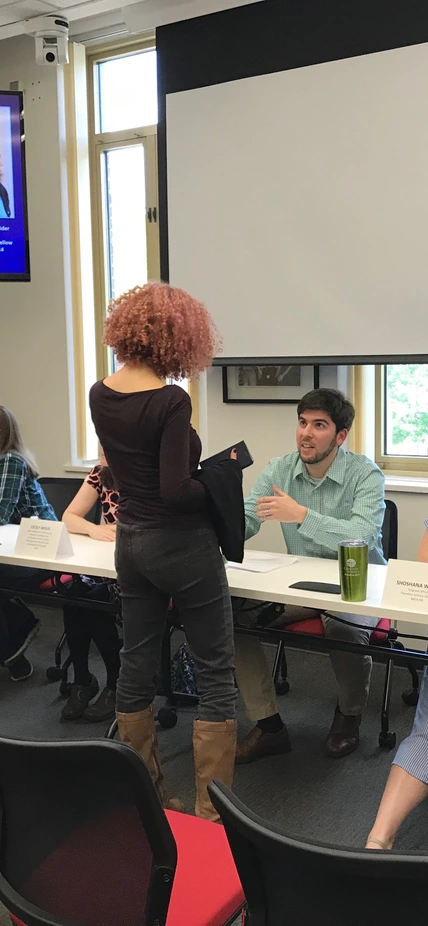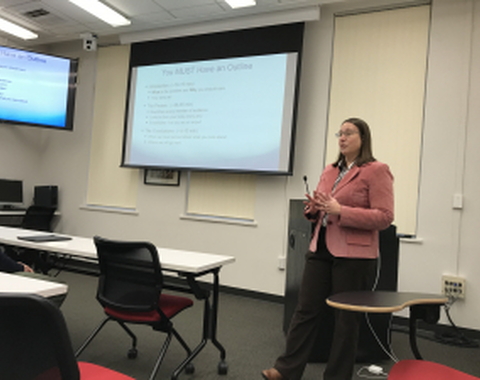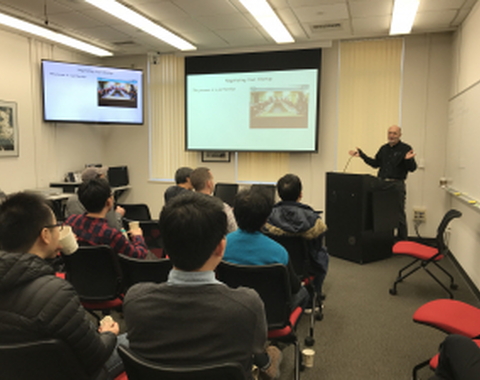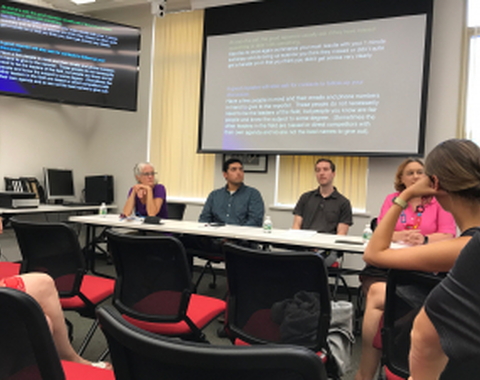Diverse Career Paths Panel
Four former EPL Postdoctoral Fellows gathered in the Abelson Collaboration Center to lead an informal Postdoctoral Development discussion regarding their respective career choices. Our panelists took turns introducing themselves and talking about the paths that took them to their current place/type of employment.
- Erika Nesvold
Former Carnegie Fellow in Astrophysics from 2015-2017, currently an Astrophysicist and Video Game Developer at Universe Sandbox
- T.J. Rodigas
Former Carnegie and Hubble Fellow from 2013-2017, currently a Senior Imaging Scientist at Applied Defense Solutions
- Shoshana Weider:
Former Carnegie MESSENGER Fellow from 2011-2014, currently a Program Officer, Planetary Science Division, at NASA Headquarters
- Cecily Wolfe:
Former Carnegie Harry Oscar Wood Fellow (1994-1996) and former Adjunct Investigator (1998-1999), currently the ANSS Coordinator and Associate Program Coordinator for Earthquake Hazards, Global Seismographic Network, and Geomagnetism Programs at the U.S. Geological Survey
Some of the advice they provided for our current postdocs:
-
If you are interested in a career outside the teaching profession, Google the jobs in which you are interested as the first step in information gathering
-
Find out what skills are needed to make you employable outside academia: e.g., coding, python, C++, writing, blogging, and editing.
-
Create a resume instead of a CV. Include many of the skills you gained while being a postdoc; don't hold back and don't go light; make it detailed. Show how your skills are transferable.
-
Remember to sell yourself as someone who can learn very quickly (after all, you do have a Ph.D., even if the position does not require a Ph.D.) and are self-disciplined.
-
-
Don't get discouraged if you need to apply to many jobs! Most people apply to many jobs before securing a position; think of it as practice.
-
Prepare for your interviews.
-
Have a good website so people can find you online.
-
Networking isn't a dirty word! Volunteer as much as you can, be a reviewer on a panel, attend meetings—that is how you network with others.
-
Sometimes, it just comes down to luck—being at the right place at the right time for that particular position.
Careers Beyond the Academy
Joel Kastner, Professor, Center for Imaging Science and School of Physics & Astronomy at Rochester Institute of Technology (RIT), and a 2017 Merle A. Tuve Fellow, spent 2018 as Chair of the AAS Committee on Employment. He presented timely data and relevant information on career paths outside the world of academic research – some of it drawn from sources like the American Institute of Physics and some from his own experiences and those of his Ph.D. students out there in the industry and/or national labs.
A few takeaways:
-
Sometimes selection is just being in the right place at the right time.
-
Never burn bridges if you do not get the position. Always thank your interviewers for their time. They may end up calling you back.
-
Statistics for tenure track positions in astronomy are flat.
-
If the prospect of fighting for grad students, postdocs, and summer salary seems overwhelming, consider stepping into "the industry."
-
Search outside the AAS for posted industry jobs.
-
Strengthen the skills the industry looks for: i.e., Python coding or programming skills.
Check out the American Institute of Physics (AIP) for statistical information and the American Astronomical Society (AAS) for articles and books on Nonacademic Career Advice.



